ASUS P8Z68-V PRO Review: Our First Z68 Motherboard
by Ian Cutress on May 11, 2011 3:13 AM EST- Posted in
- Motherboards
- Asus
- Z68
Dirt 2
Dirt 2 came to the PC in December 2009, developed by Codemasters with the EGO Engine. Resulting in favorable reviews, we use Dirt 2’s built-in benchmark under DirectX 11 to test the hardware. We test two different resolutions at two different quality settings using a discrete GPU, and an appropriate integrated GPU setting. (Since the game only runs in DX9 or DX11 modes and the HD 3000 lacks support for DX11, we test in DX9 mode on the iGPU.)
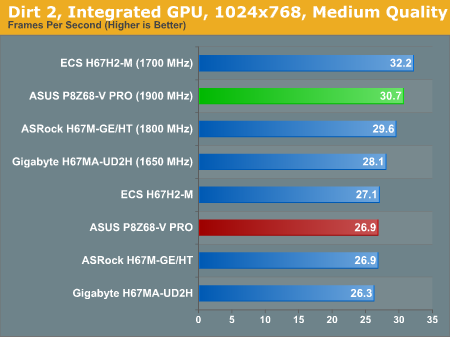
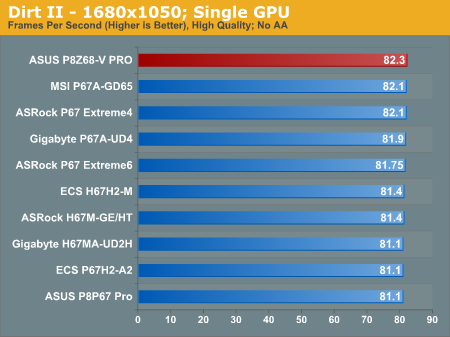
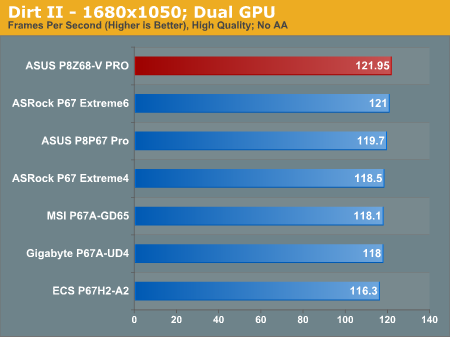
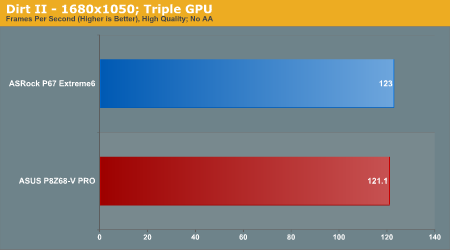
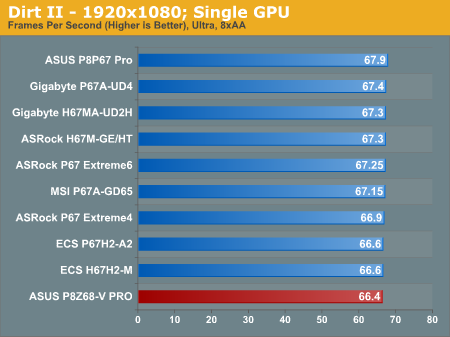
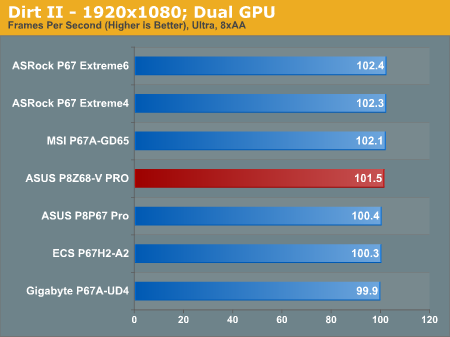
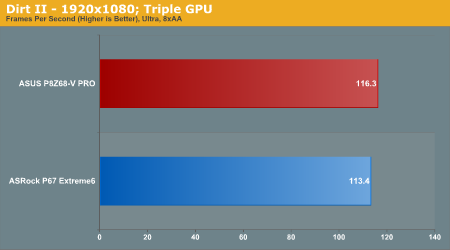
Our ASUS board does better in the 1680x1050 results than the 1920x1080, topping out the single and dual GPU results.
Metro 2033
Metro 2033 is the Crysis of the DirectX 11 world (at least until Crysis 2 is updated to DX11 support), challenging every system that tries to run it at any high-end settings. Developed by 4A Games and released in March 2010, we use the built-in DirectX 11 Frontline benchmark to test the hardware. For the iGPU, we run in DX10 mode.
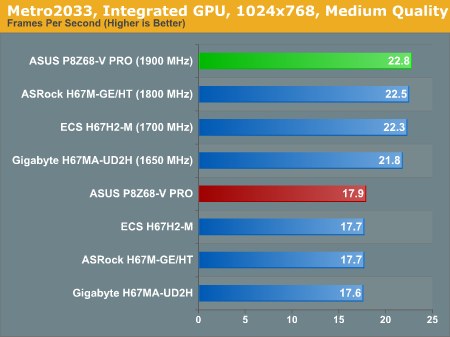
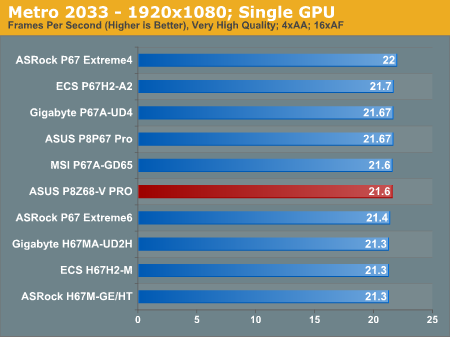
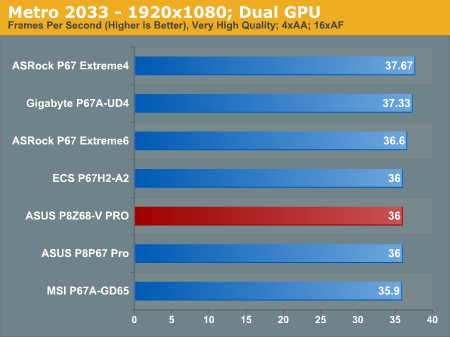
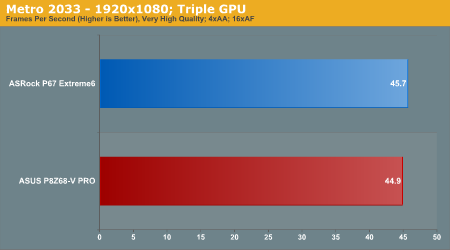
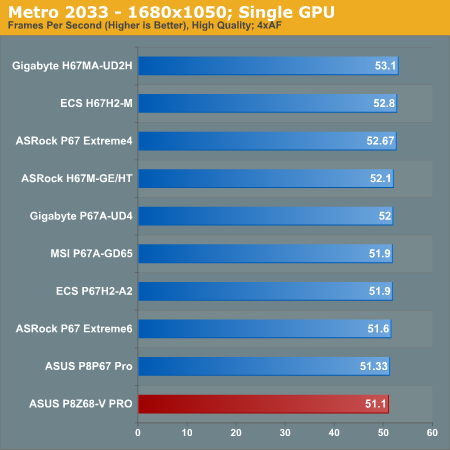
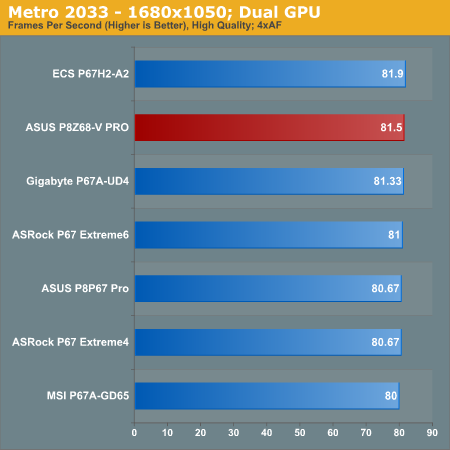
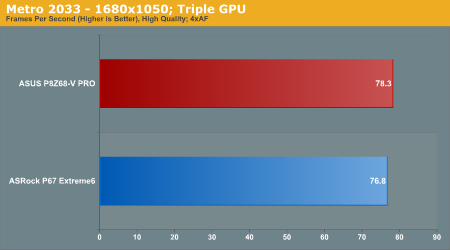










95 Comments
View All Comments
L. - Thursday, May 12, 2011 - link
IGP Intel = Ouch.I believe that if you need multiple displays you'll be far better off waiting for amd llano or the next gen of intel fail-gpu.
sylar365 - Wednesday, May 11, 2011 - link
Right now I am using an Asrock P67 Extreme 4, i5-2500k, OCZ Vertex 2 64GB with Windows and a couple frequently used apps and a WD 640GB Black SATA 2 for bulk storage. I only use one graphics card in the form of a GTX 560 ti and I appreciate it's performance but am in love with it's power usage. As far as I can tell it seems like upgrading to the Z68 platform would not provide much gain in gaming FPS, SSD longevity or overclocking ability. Those issues aside would I see ANY decrease in my monthly electric bill after partially using my CPU's on chip GPU? Even while assuming that I have some disposable income it still seems that jumping from P67 to Z68 would be like throwing money into the wind unless I plan on ... nope, nevermind ... even adding a second 560 ti would be faster on my current board. As far as investments go (for me anyway) making it rain at the local strip club is looking to be a more responsible path than upgrading to Z68.AnnihilatorX - Wednesday, May 11, 2011 - link
Or if you are like me who hold out onto my B2 P67 until it died 2 weeks ago and get a refund and buy Z68 :PSunsmasher - Wednesday, May 11, 2011 - link
Upgrade doesn't make sense for you because you apparently don't do much transcoding....L. - Thursday, May 12, 2011 - link
Like most people ;)Otherwise, this motherboard looks like a piece of trash for 210 bucks, very limited pciE, etc.. who would want it.
There is a fair chance you will see Z68 boards that are much more convincing.
Tylanner - Wednesday, May 11, 2011 - link
Man would I be upset if I held out for Z68 all these months.I was expecting an improvement in Multi-GPU Scaling(2-way Sli)
AnnihilatorX - Wednesday, May 11, 2011 - link
No. Z68 is still limited by number of PCI-E. The main reason is CPU really. You'd have to go for Z79 and Sandybridge-E for higher PCI-e lanes count.AnnihilatorX - Wednesday, May 11, 2011 - link
Actually disregard me, bandwidth should be sufficient for 2-way SLIrbusch - Wednesday, May 11, 2011 - link
On page two if the review it says...."here are a couple of negative points however - the iGPU frequency requires a reboot after every selection, and the changes you do make to the CPU frequency aren't written to BIOS (and thus aren't permanent) nor are they initialised on reboot, requiring a manual adjust on every boot."
Does this (the CPU bit) differ from the P8P67 PRO board? Am I understanding correctly that any CPU overclock done in windows (as opposed to UEFI) disappears every single time the machine is rebooted?
rbusch - Wednesday, May 11, 2011 - link
And forgive me if this is a obvious and stupid question but at (nearly) the same price point, would there be any advantages of choosing the P8P67 Pro over the P8Z68-V PRO?Thanks